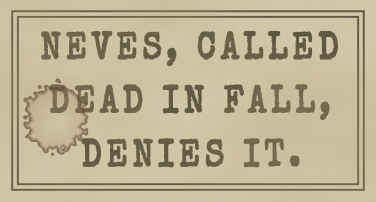 Today I want to tell you about Ralph Neves, a jockey who died and came back to life again on this day in 1936. Neves had a quick temper and a reckless attitude that earned him the nickname Portuguese Pepperpot. He was one of the most fined Jockeys on the West Coast. One trainer said of him “He was a very good rider, but he was wilder than a peach orchard boar.” which is lovely. As the above title could equally apply to my friend and ex-jockey Bob Slayer, I’m going to dedicate this post to him.
Today I want to tell you about Ralph Neves, a jockey who died and came back to life again on this day in 1936. Neves had a quick temper and a reckless attitude that earned him the nickname Portuguese Pepperpot. He was one of the most fined Jockeys on the West Coast. One trainer said of him “He was a very good rider, but he was wilder than a peach orchard boar.” which is lovely. As the above title could equally apply to my friend and ex-jockey Bob Slayer, I’m going to dedicate this post to him.
On this day Ralph Neves was riding at the Bay Meadows racetrack in San Mateo, California when four horses fell in front of him. His horse, who was called ‘Flannikins’, stopped suddenly then tripped, threw him onto the track and then fell on top of him. Neves was lifted onto a pick-up truck, as there were no ambulances on the course in those days, and taken to the first aid room. What happened next has been retold and embellished so many times, it’s hard to get to the truth of it, so here are all the versions I’ve found, because they’re all excellent.
In the first aid room he was examined by a doctor and pronounced dead. An announcement was made over the tannoy and the stunned crowd were requested to observe a moment of silence. In a last ditch attempt to revive him, the doctor injected adrenaline directly into his heart. Like a scene form ‘Pulp Fiction’, Neves suddenly revived. He demanded to ride the the rest of his races for that day. The stewards would not to let him and insisted that he spend the night in a nearby hospital under observation. They managed to keep him overnight, but the next morning he exited the hospital via a window in his hospital gown and hailed a cab back to the racetrack.
In another account he was revived in the local mortuary and ran screaming into the street, complete with toe tag, to hail a cab straight away. Or perhaps he went to a nearby snooker hall and ran round a couple of times and then hailed a cab. Neves himself insisted that he sat up and walked out of the first aid room and headed across the grandstand towards the jockeys’ room, wearing nothing but his trousers and one boot. When the crowd realized that the shirtless, bloodied, toe-tagged man who was staggering across the grandstand area was the jockey who had been declared dead about a half hour earlier, the crowd and the race officials rushed towards him. Shock turned to celebration. “At one point,” Neves later recalled, “I think everyone on the damn track was chasing me.” He arrived at the jockeys room to find his colleagues had started a collection for his widow.
So there it is. Neves was certainly declared dead and then revived. I don’t know which, if any, of these stories is the true account, but they’re all good. When I told this story to my jockey friend, he was not at all surprised. I was rather sad to learn from him that jockeys seem to fair almost as badly as race horses. Still, he’s not a jockey any more. He’s a comedian with an enormous bus. I couldn’t find a picture of Neves I could use, so here is my drawing of Bob and his Blundabus instead…

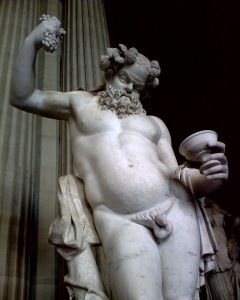 Well, today has been difficult. I have spent most of the day researching a person only to find that Wikipedia had lied to me about a date. Never mind, I didn’t really like him anyway. But, by happy chance I’ve also spent part of the day talking with a friend about a character from Greek Myth called Silenus. He was much more fun, so I’m going to tell you about him instead.
Well, today has been difficult. I have spent most of the day researching a person only to find that Wikipedia had lied to me about a date. Never mind, I didn’t really like him anyway. But, by happy chance I’ve also spent part of the day talking with a friend about a character from Greek Myth called Silenus. He was much more fun, so I’m going to tell you about him instead.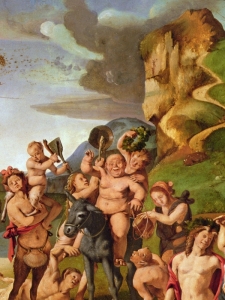 Remarkably, he is also very wise. When intoxicated, which as I mentioned is all the time, he possesses special knowledge and the power of prophecy. His favourite things are wine, music and sleep. If you can catch him sleeping and surround him with flowers or chains, he would be under your spell and he might sing for you, tell you a story or foretell your future. That is probably how he came to be at the court of King Midas. Either Midas tempted him with a fountain full of wine, so that he drank it and went to sleep, or some shepherds found him, put a crown of flowers on him and brought him to the king.
Remarkably, he is also very wise. When intoxicated, which as I mentioned is all the time, he possesses special knowledge and the power of prophecy. His favourite things are wine, music and sleep. If you can catch him sleeping and surround him with flowers or chains, he would be under your spell and he might sing for you, tell you a story or foretell your future. That is probably how he came to be at the court of King Midas. Either Midas tempted him with a fountain full of wine, so that he drank it and went to sleep, or some shepherds found him, put a crown of flowers on him and brought him to the king. Now that the Christmas season is over, everyone is thinking about getting back to normal again. Perhaps some are regretting the overindulgence. Perhaps some are thinking of giving something up. I think New Year is, with so many grim days ahead and so long to wait until spring, a terrible time to try to deny yourself the things you enjoy. That’s why I want to tell you today about the Epicureans.
Now that the Christmas season is over, everyone is thinking about getting back to normal again. Perhaps some are regretting the overindulgence. Perhaps some are thinking of giving something up. I think New Year is, with so many grim days ahead and so long to wait until spring, a terrible time to try to deny yourself the things you enjoy. That’s why I want to tell you today about the Epicureans.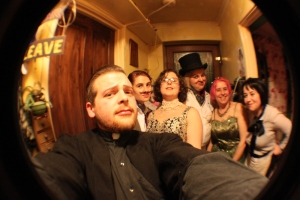 Epicurus did not put any faith in the gods, nor did he believe that there was a life beyond death. For him, the only life was this one. We should live it well and in good company. He believed that pleasure was the most important thing in life. The way to attain pleasure was to live modestly and gain knowledge about the workings of the world and learn what it is that makes us truly happy. We should stop believing in an afterlife and fearing the gods; avoid politics and people who are annoying; surround ourselves with trustworthy and affectionate friends; and, most importantly, be an affectionate, virtuous person worthy of trust. This would lead to a state of tranquillity called ataraxia and a life free from fear and from pain. Sounds good doesn’t it?
Epicurus did not put any faith in the gods, nor did he believe that there was a life beyond death. For him, the only life was this one. We should live it well and in good company. He believed that pleasure was the most important thing in life. The way to attain pleasure was to live modestly and gain knowledge about the workings of the world and learn what it is that makes us truly happy. We should stop believing in an afterlife and fearing the gods; avoid politics and people who are annoying; surround ourselves with trustworthy and affectionate friends; and, most importantly, be an affectionate, virtuous person worthy of trust. This would lead to a state of tranquillity called ataraxia and a life free from fear and from pain. Sounds good doesn’t it? The gods did not create the universe, nor did they punish or bless anyone but they were supremely happy, a condition all humans should strive for in their lifetimes. Therefore Epicurus encourages us all to pursue pleasure. Not to overindulge as this causes us suffering. Pleasures of the mind are more important than those of the body so, far from being people who wanted the best of everything, the Epicureans believed that what you ate was less important than who you ate with. Nor did they believe in breaking the law. Because the fear of being found out and the shame and pain associated with punishment takes away pleasure. Laws and punishments, for them, were to protect people from harm and leave everyone free to pursue the goal of happiness. So laws that did not contribute to human happiness were not just.
The gods did not create the universe, nor did they punish or bless anyone but they were supremely happy, a condition all humans should strive for in their lifetimes. Therefore Epicurus encourages us all to pursue pleasure. Not to overindulge as this causes us suffering. Pleasures of the mind are more important than those of the body so, far from being people who wanted the best of everything, the Epicureans believed that what you ate was less important than who you ate with. Nor did they believe in breaking the law. Because the fear of being found out and the shame and pain associated with punishment takes away pleasure. Laws and punishments, for them, were to protect people from harm and leave everyone free to pursue the goal of happiness. So laws that did not contribute to human happiness were not just.
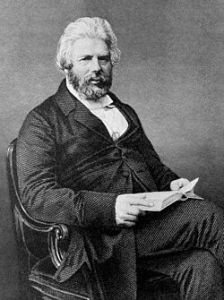 Today I have been referring to Chambers Book of Days, which is a massive two volume work written by Robert Chambers and published in 1864. It takes each day of the year, in chronological order, mentions notable births, deaths and saints days and includes several longer articles on events connected with that day. So, as you might imagine, I like him a lot.
Today I have been referring to Chambers Book of Days, which is a massive two volume work written by Robert Chambers and published in 1864. It takes each day of the year, in chronological order, mentions notable births, deaths and saints days and includes several longer articles on events connected with that day. So, as you might imagine, I like him a lot.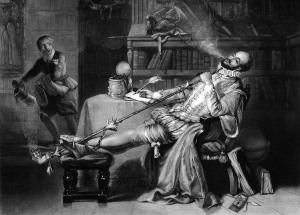 Sir Walter Raleigh once won a wager against Queen Elizabeth I about the weight of smoke contained in a pound of tobacco, they weighed out the tobacco, set fire to it and then weighed the ashes. By subtracting the weight of the ashes from the original pound they assumed they had calculated the weight of the smoke. Then there was a gentleman named Corbet, about whom we know nothing except for the fact he made a bet that his leg was the handsomest in the whole kingdom. Apparently he won and, in 1864 at least, his family still had a picture showing how the legs of the various claimants were measured.
Sir Walter Raleigh once won a wager against Queen Elizabeth I about the weight of smoke contained in a pound of tobacco, they weighed out the tobacco, set fire to it and then weighed the ashes. By subtracting the weight of the ashes from the original pound they assumed they had calculated the weight of the smoke. Then there was a gentleman named Corbet, about whom we know nothing except for the fact he made a bet that his leg was the handsomest in the whole kingdom. Apparently he won and, in 1864 at least, his family still had a picture showing how the legs of the various claimants were measured. There was the case of John James Heidegger, Master of Revels to George II. He was not a good looking man, but took this fact with good humour. He bet his friend, the Earl of Chesterfield, that he could not produce an uglier person than himself in the whole of London. A search was made and the earl presented a very old lady from the neighbourhood of St Giles who was, at first sight, as poorly blessed by good looks as himself. But then Heidegger asked if he might put on the lady’s bonnet, and everyone had to agree that he had won his bet.
There was the case of John James Heidegger, Master of Revels to George II. He was not a good looking man, but took this fact with good humour. He bet his friend, the Earl of Chesterfield, that he could not produce an uglier person than himself in the whole of London. A search was made and the earl presented a very old lady from the neighbourhood of St Giles who was, at first sight, as poorly blessed by good looks as himself. But then Heidegger asked if he might put on the lady’s bonnet, and everyone had to agree that he had won his bet.